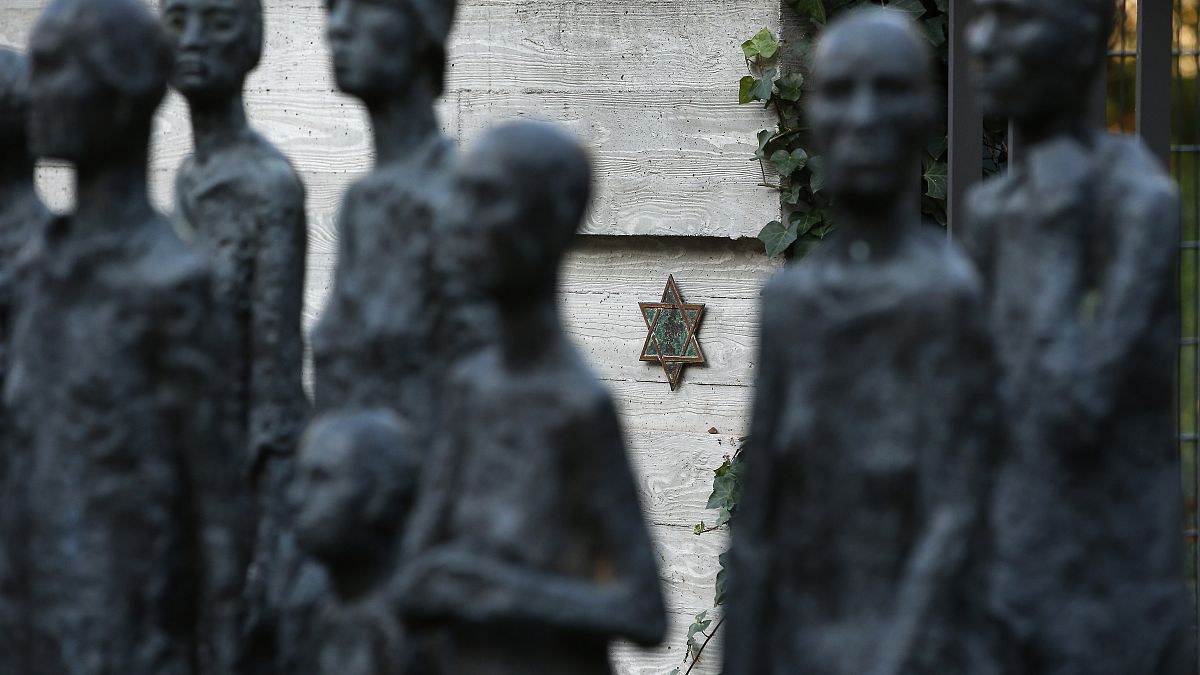On International Holocaust Remembrance Day, on 27 January, people remember the six million Jews and millions of other victims of Nazi persecution during WWII.
Monday marks the 80th anniversary of the liberation of Auschwitz-Birkenau, a date which has been designated by the United Nations General Assembly as International Holocaust Remembrance Day.
Jewish groups have, however, been sounding the alarm over rising antisemitism on a global level. Antisemitism commissioner in Berlin, Sigmount Königsberg, says that hatred against Jews is a chameleon, and that he doesn’t feel as safe in Germany as he did 20 years ago.
“There are no longer any Jewish events, not even a Jewish puppet theatre for children, that are not protected by the police,” he says, while pointing at the airport-style security to enter the synagogue where he was interviewed by Euronews.
Meanwhile, earlier this month, a survey by US campaign group the Anti-Defamation League found that 1 in 12 adults in Germany and 46% of adults worldwide hold significant antisemitic views.
“We are under attack – we are attacked by friends of Hamas, by the extreme left, by so-called antifascists and by Islamists. We are also attacked by the extreme right. Political groups that are otherwise bitterly opposed to each other and even fight one another unite in their antisemitism. This is happening here with a vehemence and intensity we have never experienced before. This is the reality, and it has reached a point where it becomes very difficult. There are people who, just a few years ago, openly displayed their Jewish identity but no longer do so,” he added.
Königsberg says that myths antisemitic myths have always persisted: “For instance, people now say ‘Zionist’ instead of ‘Jew’, but it ultimately amounts to the same prejudice.” He also references conspiracy theories surrounding the Rothschild family.
According to the German Interior Ministry, the number of antisemitic attacks in Germany reached a new record high in 2024. Königsberg says that there has been a “massive assault on Jewish life, particularly in Berlin” since the attack on Israel by militant group Hamas on 7 October 2023, which was followed by a 15-month-long war which halted after a ceasefire agreement was reached this month.
“The complacency of the majority of society, which identifies as democratic, must end. Evil thrives when good people fail to stand up against it. Allowing hatred to go unchecked only strengthens it. When those who spread hate face no limits, they feel emboldened to continue.”
The role of social media
Königsberg partly blames social media, where hate speech often goes unchecked, especially following the decision by several social media companies such as X, run by Elon Musk, and Meta, run by Mark Zuckerberg, to scale back fact-checking efforts. This also leads to a polarisation of the population, he says, such as during the pandemic when untruths about Jews and COVID-19 ran rampant on social media.
“Social media also amplifies this danger by reducing complex topics to short soundbites and simple slogans without in-depth analysis or meaningful answers. This is precisely what the AfD (Alternative for Germany) does – it offers simplistic solutions. However, these solutions are outdated, originate in the 1940s and 1950s, and fail to address the complexities of the 21st century,” he says.
Königsberg also believes that extremist parties capitalise on this and reinforce prejudices about Jews.
“The AfD has dramatically intensified political discourse, making statements acceptable that were once deemed unspeakable because they were offensive. Provocation and scandal have become part of the political strategy, where the goal is not factual arguments but rather sensationalism.”
But the AfD is only part of the problem, according to Königsberg.
“The political climate here has, of course, significantly intensified over the past 15 years. This is not a development that occurred just in the last two years but has gradually worsened over a longer period. Political discourse rarely takes place anymore. Instead of exchanging arguments, people stick rigidly to pre-defined positions, either A or B, and neither side engages in meaningful dialogue,” he says.
He urges more tolerance and for both sides of the political divide to listen calmly to each other and reflect. Königsberg believes that the ability to see things from others’ perspective is “relatively underdeveloped in Germany.”
How can we banish antisemitism?
In order to tackle antisemitism and the conspiracy myths associated with it, “we must address people on an emotional level,” he says, highlighting that although it is challenging and resource-intensive, efforts must be made to reach individuals emotionally.
“This effort requires confronting antisemitic narratives not only in traditional family stories but also on social media and internet platforms. These platforms transmit unfiltered antisemitic content in various languages – German, English, French, Arabic and others,” Königsberg adds.
“The internet has become a breeding ground for hate. In the past, such remarks might have been limited to small gatherings at a pub, for example, where only a handful of people heard them. Now, a post on X or Instagram can instantly reach thousands or tens of thousands of people. Even if people don’t like or share the content, they still see it, and this visibility matters. Systematic repetition reinforces antisemitic narratives,” he explains.
Combatting hate speech requires efforts on multiple fronts such as education, media reforms, and internet regulation – “a Sisyphean task”, concludes Königsberg, which requires “immense effort and continuous work”.
Read the full article here


